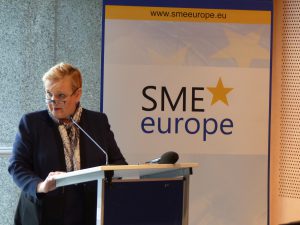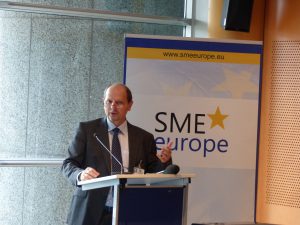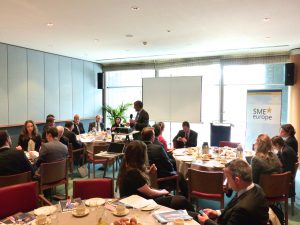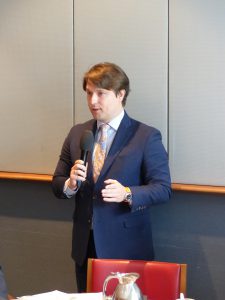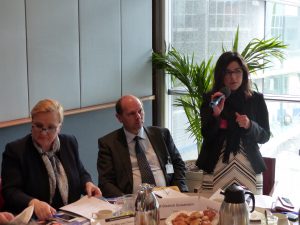End of roaming for Europe’s Digital Single market
On 19th of April SME Europe in cooperation with MEP Rosa Gräfin von Thun und Hohenstein hosted a working breakfast on the subject of the importance of the end of roaming for Europe’s Digital Single market. Although legislation has been passed in 2015, the political importance and impact of the end of roaming will now begin to be noticed. Moreover, the legislative and economical challenges have yet to be tackled.
Roza Gräfin von Thun und Hohenstein MEP opened the Working Breakfast by welcoming the attendees, expressing her gratitude for the great number of participants in spite of the horrible events in Brussels a few weeks earlier. Mrs. Thun und Hohenstein emphasized the political impact of the end of roaming which can be seen as a symbolic decision. She stated that it is crucial to break down barriers in difficult times where the migration crisis and other difficulties test the strength of the EU. Initiatives such as the end of roaming allow the Union to grow stronger together, trigger awareness of the benefits for citizens and create a Europe of more Union.
Wolf-Dietrich Grussmann, Head of European Commission Unit of Regulatory Coordination and Buisness, started with revisit of the road that led to the end of roaming: the long process prices decreased throughout Europe while usage has risen. Nevertheless, the diverted national bases comprise an irregularity in the single market which has fostered high Roaming charges over the years. Therefore, Mr. Grussmann stated it was crucial to differentiate between the wholesale and the retail market. While the retail side has been addressed, solutions for the wholesale market are still needed. The two important elements of this where outlined as; the cost recovery for the networks that have been effected, as well as sustainability.
However, Mr. Grussmann pointed out that the end of roaming was equally important for citizens as well as businesses through the “Roam Like Home” initiative. The Commission was furthermore setting up the according parameters in order to assure that national prices would not increase drastically. The transition must be especially understood as a key tool to prevent an increase in prices. Mr. Grussmann outlined the next steps in order to achieve the aim of the Directive fully. He stated that the Commission’s wholesale review was due by the 15th June. The measures assessed and taken concern the fair use policy, sustainability mechanisms as well as the Impact Assessment and Implementing acts. Finally it is the Commission´s goal to deliver upon the commitments made and is therefore on track for the review and Impact assessment. Therefore, in order to assure as swift agreement on the wholesale regulation the proposal will be made by June 2016 in order for the European Parliament and Council to end charges as promised by 2017.
Luc Hendrickx, Head of UAPME, opened by picking up on MEP Gräfin von Thun und Hohenstein´s statement that roaming was a political and symbolic issue, adding that it was maybe too symbolic. He stated that in general the end of roaming was positive as every reduction of costs was favorable. Nevertheless, he outlined that the EU was imposing rules on actors that are less European but rather more national similar to the situation with geo-blocking. Mr Hendrickx went on to raise a series of questions. Firstly, he questioned if the functioning of national roaming on national markets. Secondly, if the Commission is be able to monitor the entire market and whether the Commission can safeguard accordingly. Thirdly, if small providers will be able to survive against big players. Fourthly, Mr. Hendrickx pointed out that it was uncertain how prices would develop due to the differences in the national markets. Finally, the difficulties of permanent roaming where outlined through technical difficulties such as machine to machine interaction. In conclusion Mr. Hendrickx stated that the political decision left lots of open questions and uncertainties and further legislation was needed.
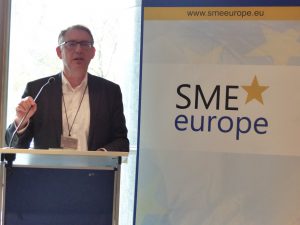
In a brief answer to some of the questions raised by Mr. Hendrickx, Mr. Grussmann replied that the Commission was already taking the according steps and measures. The transposition period is utilized to secure a smooth transition to go along with the further legislation that is needed. Moreover fair use is meant as a safeguard but further thought is needed towards cross border activities.
Mr. Markus Stock from the Head of EU-Office of the Austrian Federal Chamber of Commerce opened the round of statements. He outlined that the Austrian Federal Chamber of Commerce represents approximately 450.000 businesses with the majority being SMES. Mr. Stock stated that it was crucial to see what effects the end of roaming will have on the Telekom sector which he identified as the driver of the single market. Nevertheless, he was uncertain if the average SME would profit from the decision taken as most SMES operate nationally and roaming has not been identified as a relevant cost factor. Moreover, Mr. Stock was worried that an increase in national prices could be the result. He highlighted that what is needed is infrastructure and was uncertain if the legal framework is the right way to go but rather called for the necessity to boost investments to achieve proper infrastructure.
The Head of Government and Regulatory Affairs of America Movil and former Minister of ICT of Macedonia, Ivo Ivanovski pointed out that there was a growing demand in quality for which infrastructure is the crucial key point. He estimated that the EU would need 100 billion euros to achieve its 2020 targets and crucial investments are needed as the EU has fallen behind the USA and Asia. Concerning the difficulties of fair use Mr. Ivanovski highlighted that price differences when buying roaming packages abroad creates imbalances. Finally Mr. Ivanovski called for legislation that would foster and create innovation, jobs etc.
Valeria Barbaro, the Head of the Brussels office for Telekom Austria EU Representation, opened by stating that the end of roaming was a burden for Telecom providers as it forced them to change their cost structures, price packaging and others. She identified that the roaming deal is a price regulator, possibly at the expense of quality. Telekom Austria was briefly introduced as a company operating in 8 countries of which 4 are member of the EU. Ms. Barbaro stated that the end of roaming would hamper competitiveness for small providers such as the Telekom Austria. According to her, only a small number of SMES were concerned by the roaming legislation. Ms. Barbaro saw the Telecom Framework Review seen as a chance for everything, meaning that it was a possibility to take the according steps in order to achieve what it should be leading to more Europeanization through less fragmentation creating a level playing field.
In the following discussion the arguments of the speakers were intensified. Brian Hayes MEP pointed out the importance of the end of roaming as political signal to Europe’s population to show them that the European Union works to their favor. Other guests stated that abolishing roaming could force operators to be more innovative and that it could also be an incentive for people to go abroad. Mr. Ivanovski emphasized that for the future it will be very important to have good quality of connections. At the end Mr. Grossmann promised that the commission is trying to find a good balance between consumers and operators interest and that they are seriously looking at the addressed concerns.

